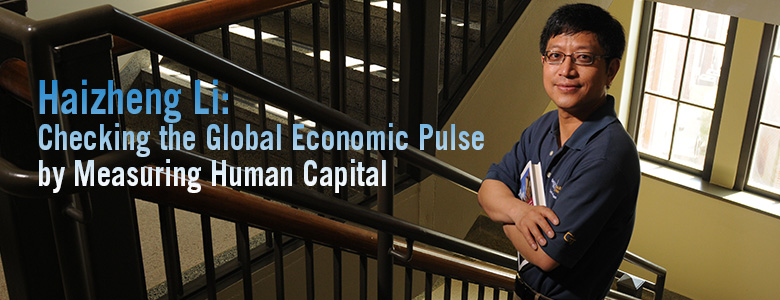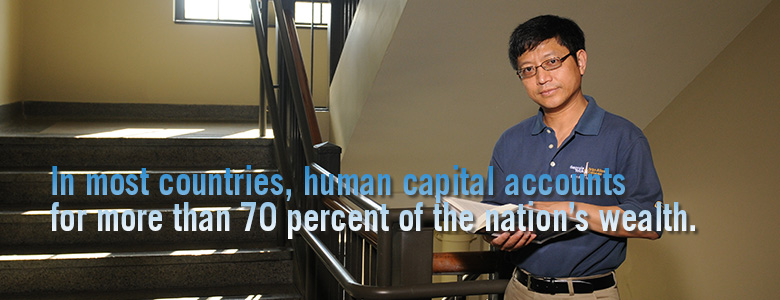
Ask Haizheng Li what he likes about being a professor, and he'll mention the opportunity to conduct research and the freedom to set his own schedule. But most of all, he enjoys teaching.
"It's a chance to interact with the young generation," says Li, an economics professor in the Ivan Allen College's School of Economics since 1997. "You learn what they are thinking about and get new ideas from them. That is very rewarding, so I think it is a privilege to be in this profession."
Li particularly enjoys working with Georgia Tech students because "they are very serious, hardworking students. And when they don't understand something, they work harder -- they don't automatically feel it's the professor's fault!" he laughs.
What is your primary area of research?
My current research concerns human capital -- its measurement, sources and its effect on labor markets.
What do you mean by human capital?
There are several definitions, but the most widely used one defines human capital as the measure of a person's knowledge, skills and competencies that facilitates the creation of personal, social and economic well-being. So it's about the skills that create certain labor market outcomes such as improving one's chance of getting employed or making higher earnings.
What's an example of a research project you are working on now?
Right now I have two major ongoing projects that look at human capital measurement -- one from a macro level and the other on an individual level. Both involve huge amounts of data and calculations.
On the macro level, an international team of scholars from the U.S. and China is working with me to measure China's human capital stock, both at the national and provincial levels. We started this work in 2008.
Analyzing data from 1985 to 2009, we have finished an estimation of China's human capital at the national level and are in the process of estimating human capital for each of the 31 province-level administrative areas. We've completed 17 so far.
What are some of your findings?
Human capital has played a significant role in China's dramatic economic growth -- per capita real human capital increased almost four times in China during 1985-2009, although there remain significant disparities in human capital between urban and rural areas, and between men and women.
China has a large total human capital stock, but on a per capita basis it is small compared to other countries -- one-fourth of Canada's and only one-sixth of the U.S.'s human capital stock. So China still has a long way to go before it will become a leading country in human capital.
And your second project?
This one is a large European Union project about life-long learning. There are eight or nine research teams from different countries involved, and we're developing a measurement of complex problem-solving skills, studying how the these skills are formed, and how they affect the productivity of individuals, companies and countries.
The EU work is interdisciplinary in that it involves researchers from economics, public policy and psychology. We tell the psychologists what we want to measure, for example, and they come up with a test that's administered to a representative sample of individuals. We then take the test results and apply that data -- complex problem solving ability -- to our measurement of human capital.
What is significant about these projects?
In most countries, human capital accounts for more than 70 percent of the nation’s wealth. Human capital is an important source of economic growth and innovation, an important factor for sustainable development, and for reducing poverty and inequality.

Until we began our work in 2008, there had been almost no comprehensive measurement of the total stock of human capital in China. Human capital measures for China are central to any understanding of the global importance of human capital for a number of reasons. China is the most populous country in the world, so it's important to understand the dynamics of human capital caused by demographic changes and by the rapid expansion of education during the course of economic development. In addition, such measures allow for better assessment of the contribution of human capital to growth, development and social well-being in empirical and theoretical research.
A unique aspect of the European Union study is that the research teams simultaneously develop the complex problem-solving skills measurement, study its sources and its impact at the individual, company and country levels. Traditionally, human capital has been measured by education and job training -- identifying complex problem-solving skills adds a new and useful dimension.
In the U.S., for example, while highly skilled individuals account for only 10 percent of the workforce, they have a disproportionately large impact on the economy and economic development. This is a growing trend among Western countries, so the construction of comprehensive human capital measures that take into account the growing importance of complex job skills is an important step in assessing economic growth.
How might your findings be used?
The results from both projects can be used by governments for policy making, by international organizations for cross-country study and by scholars for their economics research work.
We've released a China human capital report annually since 2009, and the series has drawn a lot of attention. In fact, the World Bank has incorporated our human capital measurement in China into its official report.
How does your research fit in with a Georgia Tech education?
A number of Georgia Tech Master's and Ph.D.students at the School of Economics, Ivan Allen College, participated in these projects, and the research materials are often used in my econometrics class as real-world case studies.
Moreover, my research connections with Chinese universities generate additional opportunities for Georgia Tech students. For example, I was able to obtain a fellowship for an undergraduate student from the School of Modern Languages at the Ivan Allen College to study in Changsha, China for one year. I am also helping to find more locations in China for the school's Language for Business and Technology Program.
Would you say that your research reflects a growing international focus at Georgia Tech?
Yes it does, and I think that's a good thing. The nations of the world are much more closely tied to one another than ever before. Georgia Tech is doing very well in recognizing this trend and encouraging faculty to pursue international research opportunities, which in turn create opportunities for students to gain valuable overseas experience and improve their career prospects.
I was co-director of the Georgia Tech-Shanghai program for three years. Every year we sent between 40 and 60 students to China for nine weeks. All of the feedback was very positive -- students found the experience very rewarding.
As a top engineering school, many of our Georgia Tech students will end up at multinational corporations. They'll find themselves working with people from different countries, different cultures and races, so it is very important for faculty members and students to have some kind of international exposure, international connections. So I think it's always good to have some international flavor or content in the culture of Georgia Tech.
About Haizheng Li
Professor, School of Economics
PhD in economics from the University of Colorado-Boulder.
Dr. Haizheng Li joined the Georgia Tech faculty in the School of Economics in 1997, was promoted to Associate Professor in 2004 and Professor in 2010. A specialist in applied econometrics, labor economics, industry studies and Chinese economy, he has authored numerous journal articles, book chapters, and technical reports. He has received two research grants from Sloan Foundation Center for Paper Business and Industry Studies, and a number of grants from China. He has served as a consultant for the World Bank, a Special Research Fellow of Shanghai Development and Reform Commission in China, and is a member of Advisory Board of China Economic Review, and President of the Chinese Economists Society (2006-07). At Georgia Tech, he served as Academic Senate and General Faculty Assembly Representative, Co-director of Georgia Tech-Shanghai Summer Program (2005-07), and Director of Information Technology in the School of Economics.
Academic Research Fields: Econometrics, Labor Economics, Economic Forecasting and Microeconomics.
